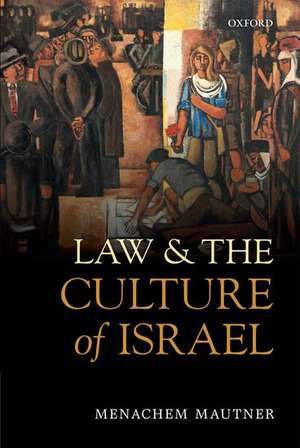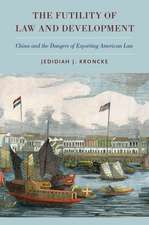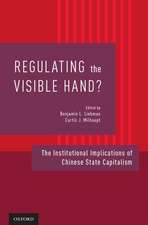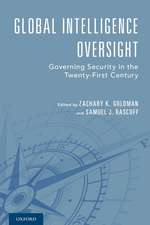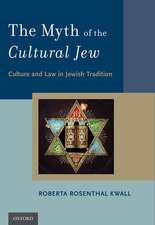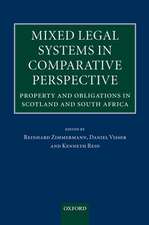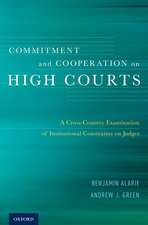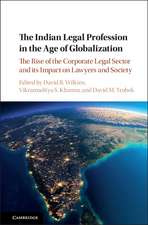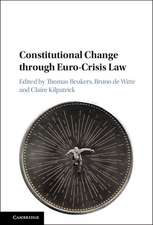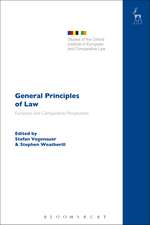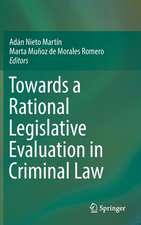Law and the Culture of Israel
Autor Menachem Mautneren Limba Engleză Hardback – 26 ian 2011
Preț: 523.32 lei
Preț vechi: 748.87 lei
-30% Nou
Puncte Express: 785
Preț estimativ în valută:
100.13€ • 104.56$ • 82.69£
100.13€ • 104.56$ • 82.69£
Carte tipărită la comandă
Livrare economică 05-11 aprilie
Preluare comenzi: 021 569.72.76
Specificații
ISBN-13: 9780199600564
ISBN-10: 0199600562
Pagini: 280
Dimensiuni: 170 x 240 x 23 mm
Greutate: 0.57 kg
Ediția:New.
Editura: OUP OXFORD
Colecția OUP Oxford
Locul publicării:Oxford, United Kingdom
ISBN-10: 0199600562
Pagini: 280
Dimensiuni: 170 x 240 x 23 mm
Greutate: 0.57 kg
Ediția:New.
Editura: OUP OXFORD
Colecția OUP Oxford
Locul publicării:Oxford, United Kingdom
Recenzii
This is a remarkable tour de force that brings together fresh and original insights from the fields of law, political and social sciences, cultural studies, history, literature, and other academic areas. Mautner offers a fascinating panorama of Israeli cultural and legal history from the early twentieth century to the first decade of the new millennium.
Menachem Mautner...weighs the efforts of Chief Justice Aharon Barak and others in the 1980s and 1990s to vastly extend the scope of the court's powers...warmly recommended.
Menachem Mautner identifies the Israeli Supreme Court as the institution through which Israeli secularists, looking to Anglo-American liberalism for their models, resist the religious fundamentalism that asserts itself elsewhere in Israeli political life.
This is a remarkable and important book. It is a fascinating and sensitive account of the struggle between the secular and the religious in Israeli law, and how this struggle shapes Israeli culture. Sustained by notions of multiculturalism, political liberalism and republicanism, it offers a penetrating reflection on how to manage Israel's divisive situation.
It gave me, as one who is interested in Israel but knows rather little about it, exactly what I wanted to know, all with a kind of self-evident fairness and balance that was especially impressive given the historically contested nature of so many questions about Israel and its history.
...a penetrating study of the role of the activist Israeli Supreme court in the changing political and economic context of the past thirty years. Mautner argues, with calm conviction, that difficult political choices embracing greater multiculturalism need to be made so as to reconcile the centrifugal tendencies of the divided components of Israeli society. But he also offers valuable lessons for those interested in the increasing importance of Supreme and constitutional courts worldwide. An indispensable work of legal scholarship and political analysis.
This book by Menachem Mautner is one of the most important academic acheivements ever published on the relationship between law and culture in Israel...(it) respects the importance of (the law's) Jewish characteristics and yet allows greater freedom and human righrs to it's non-Jewish minorities... This book is unquestionably required reading for all students, scholars, and serious observers of law and society in Israel.'
There can be no doubt that Professor Mautner has made a significant contribution to our understanding of law and culture in Israel. His book is a model of an intelligent, thought-provoking study of law and society.
Mautner's current book, ^iLaw and the Culture of Israel^r, condenses twenty years' worth of publications into 226 pages. Subjects Mautner has discussed at great length in Hebrew are here discussed in brief.
...an excellent guide for anyone seeking to understand the special place of law in Israeli society today.
Menachem Mauter's excellent book offers a persuasive account of Israeli law as an arena in which the struggle over Israeli culture and identity is being waged. Mautner skillfully explores the main identity problems that have bewildered modern Jews and Israelis for decades. ... This illuminating volume bravely asks the important questions that will shape Israeli political, legal, and academic discourses in the coming years. Anyone interested in Israel's past, present, and future should read this excellent book.
Menachem Mautner...weighs the efforts of Chief Justice Aharon Barak and others in the 1980s and 1990s to vastly extend the scope of the court's powers...warmly recommended.
Menachem Mautner identifies the Israeli Supreme Court as the institution through which Israeli secularists, looking to Anglo-American liberalism for their models, resist the religious fundamentalism that asserts itself elsewhere in Israeli political life.
This is a remarkable and important book. It is a fascinating and sensitive account of the struggle between the secular and the religious in Israeli law, and how this struggle shapes Israeli culture. Sustained by notions of multiculturalism, political liberalism and republicanism, it offers a penetrating reflection on how to manage Israel's divisive situation.
It gave me, as one who is interested in Israel but knows rather little about it, exactly what I wanted to know, all with a kind of self-evident fairness and balance that was especially impressive given the historically contested nature of so many questions about Israel and its history.
...a penetrating study of the role of the activist Israeli Supreme court in the changing political and economic context of the past thirty years. Mautner argues, with calm conviction, that difficult political choices embracing greater multiculturalism need to be made so as to reconcile the centrifugal tendencies of the divided components of Israeli society. But he also offers valuable lessons for those interested in the increasing importance of Supreme and constitutional courts worldwide. An indispensable work of legal scholarship and political analysis.
This book by Menachem Mautner is one of the most important academic acheivements ever published on the relationship between law and culture in Israel...(it) respects the importance of (the law's) Jewish characteristics and yet allows greater freedom and human righrs to it's non-Jewish minorities... This book is unquestionably required reading for all students, scholars, and serious observers of law and society in Israel.'
There can be no doubt that Professor Mautner has made a significant contribution to our understanding of law and culture in Israel. His book is a model of an intelligent, thought-provoking study of law and society.
Mautner's current book, ^iLaw and the Culture of Israel^r, condenses twenty years' worth of publications into 226 pages. Subjects Mautner has discussed at great length in Hebrew are here discussed in brief.
...an excellent guide for anyone seeking to understand the special place of law in Israeli society today.
Menachem Mauter's excellent book offers a persuasive account of Israeli law as an arena in which the struggle over Israeli culture and identity is being waged. Mautner skillfully explores the main identity problems that have bewildered modern Jews and Israelis for decades. ... This illuminating volume bravely asks the important questions that will shape Israeli political, legal, and academic discourses in the coming years. Anyone interested in Israel's past, present, and future should read this excellent book.
Notă biografică
Menachem Mautner is a Professor of Law and the Danielle Rubinstein Chair of Comparative Civil Law and Jurisprudence, in the Faculty of Law at Tel Aviv University. He was Dean of the Faculty. Mautner teaches courses in the areas of law and culture, multiculturalism and contract law, and was awarded the 'Zeltner Prize for Excellence in the Law' and the Tel Aviv University Rector's Prize for Distinction in Teaching. He is the Editor-in-Chief of the book series Law, Society and Culture published by the Faculty of Law, Tel Aviv University. Mautner is the author of four books, and his book The Decline of Formalism and the Rise of Values in Israeli Law is the most cited book in Israeli law in the past two decades. Mautner is also the editor of five books, including Multiculturalism in a Democratic and Jewish State, and the author of over 70 articles and chapters in the areas of law and culture, multiculturalism, jurisprudence and contract law.
